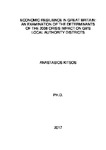ECONOMIC RESILIENCE IN GREAT BRITAIN: AN EXAMINATION OF THE DETERMINANTS OF THE 2008 CRISIS IMPACT ON GB'S LOCAL AUTHORITY DISTRICTS
| dc.contributor.supervisor | Bishop, Paul | |
| dc.contributor.author | Kitsos, Anastasios | |
| dc.contributor.other | Faculty of Arts, Humanities and Business | en_US |
| dc.date.accessioned | 2018-02-08T13:55:58Z | |
| dc.date.issued | 2018 | |
| dc.identifier | 10421448 | en_US |
| dc.identifier.uri | http://hdl.handle.net/10026.1/10755 | |
| dc.description.abstract |
In 2008, a severe economic crisis hit economies around the world. Its effects included a significant loss of GDP and employment which led to several social ills associated with recessions. However, the crisis did not impact all places with the same severity. This thesis investigates the crisis impact across GB Local Authority Districts during 2008-2014 within a framework that utilises the concept of economic resilience. However, this concept does not have a universally accepted definition or methodology of investigation. Hence, the study adopts an operational definition, comparing the conditions in local labour markets before and after the start of the recession. Using this method, a wide variation in resilience performance is identified across spatial areas. To identify the determinants of these differences, the study critically examines existing empirical studies and relevant theories. The factors identified range from past labour market performance to industrial structure, skills, demographics and other variables. The thesis then adopts an empirical method of investigation utilising a cross-sectional model. The results indicate that places which performed well before the start of the crisis have suffered deeper crisis impacts. However, the share of younger aged population and degree level qualification holders has mitigated the impact. The results are confirmed by robustness checks concerning the influence of outliers, migration and exploring the use of a composite indicator of resilience. It is the first time that a study of the crisis has focused on GB Local Authority Districts and comprehensively examined local labour markets. Moreover, the study makes a contribution by providing an operational definition and methodology for measuring resilience and empirically testing the impact of a range of determinants of resilience performance. The policy implications suggest a greater focus on skills and the attraction of younger aged workers through increased embeddedness of anchor institutions such as universities, as well as the inclusion of resilience as a core element of place-based policies. | en_US |
| dc.description.sponsorship | Plymouth University, Faculty of Business, School of Management | en_US |
| dc.language.iso | en | |
| dc.publisher | University of Plymouth | |
| dc.subject | Regional economic resilience | en_US |
| dc.subject | Skills | |
| dc.subject | Demographics | |
| dc.subject | Local authorities | |
| dc.subject.classification | PhD | en_US |
| dc.title | ECONOMIC RESILIENCE IN GREAT BRITAIN: AN EXAMINATION OF THE DETERMINANTS OF THE 2008 CRISIS IMPACT ON GB'S LOCAL AUTHORITY DISTRICTS | en_US |
| dc.type | Thesis | |
| plymouth.version | publishable | en_US |
| dc.identifier.doi | http://dx.doi.org/10.24382/1024 | |
| dc.rights.embargodate | 2019-02-08T13:55:58Z | |
| dc.rights.embargoperiod | 12 months | en_US |
| dc.type.qualification | Doctorate | en_US |
| rioxxterms.version | NA | |
| plymouth.orcid.id | 0000-0002-5338-2714 | en_US |
Files in this item
This item appears in the following Collection(s)
-
01 Research Theses Main Collection
Research Theses Main


